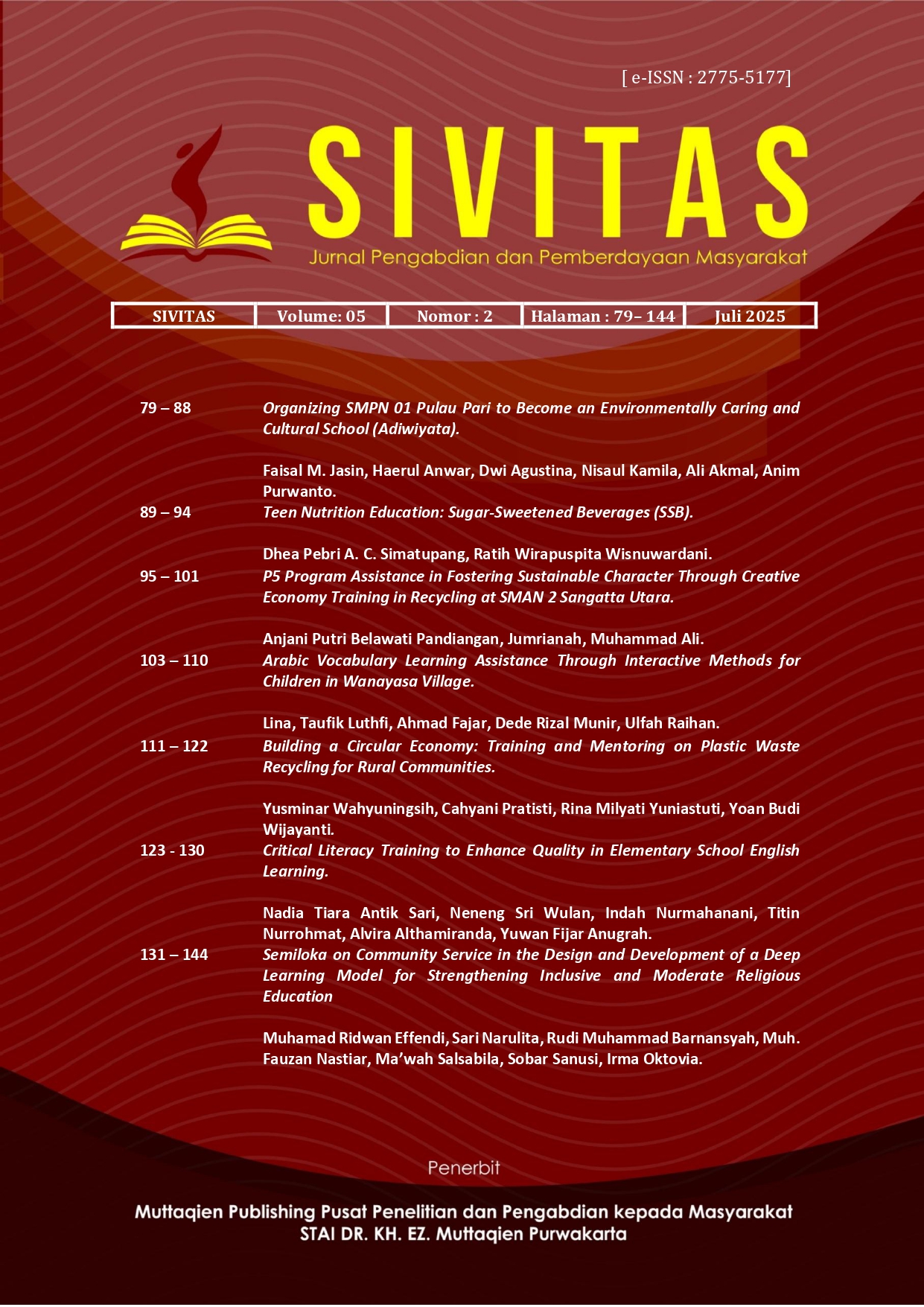Nutrition Education for Adolescents: Sugar-Sweetened Beverages (SSB)
Keywords:
Adolescent Obesity, Sugar-Sweetened Beverages (SSB), Nutrition Literacy, Health EducationAbstract
The 2023 Indonesian Health Survey (SKI) indicates a 5.6% prevalence of obesity among adolescents, while national obesity in adults has risen to 23.4%. High consumption of Sugar-Sweetened Beverages (SSBs) among adolescents is a risk factor for obesity and other chronic diseases.To address this issue, a community service program was conducted at SMK Negeri 1 Tenggarong with the aim of improving nutrition literacy and reducing SSB consumption. The program involved 30 students and employed an action research design with a cross-sectional approach.Evaluation was carried out through pre-test and post-test questionnaires containing 10 questions to assess nutrition literacy and SSB consumption. The Wilcoxon test was used to analyze differences in knowledge scores before and after the education intervention.Results showed a significant improvement in students' nutrition literacy after participating in the program. This program is expected to contribute to raising awareness about the negative impacts of SSBs and promoting healthy lifestyle behaviors among adolescents.
References
BKPK Kemenkes. (2023). SKI 2023 Dalam Angka. - Badan Kebijakan Pembangunan Kesehatan. https://www.badankebijakan.kemkes.go.id/ski-2023-dalam-angka/
Friedman, H. S., Martin, L. R., Tucker, J. S., Criqui, M. H., Kern, M. L., & Reynolds, C. A. (2008). Stability of Physical Activity across the Lifespan. Https://Doi.Org/10.1177/1359105308095963, 13(8), 1092–1104. https://doi.org/10.1177/1359105308095963
Imoisili, O. E., Park, S., Lundeen, E. A., Yaroch, A. L., & Blanck, H. M. (2020). Daily Adolescent Sugar-Sweetened Beverage Intake Is Associated With Select Adolescent, Not Parent, Attitudes About Limiting Sugary Drink and Junk Food Intake. American Journal of Health Promotion, 34(1), 76–82. https://doi.org/10.1177/0890117119868382
JDIH Kemenkes. (2014). PERATURAN MENTERI KESEHATAN PERMENKES NOMOR 25 TAHUN 2014. https://regulasi.bkpk.kemkes.go.id/detail/ffb9b802-9f1b-4d14-a945-2fa830ac0db0/
Joulaei, H., Keshani, P., & Kaveh, M. H. (2018). Nutrition literacy as a determinant for diet quality amongst young adolescents: A cross sectional study. Progress in Nutrition, 20(3), 455–464. https://doi.org/10.23751/PN.V20I3.6705
Koca, B., & Arkan, G. (2020). The relationship between adolescents’ nutrition literacy and food habits, and affecting factors. Public Health Nutrition, 24(4). https://doi.org/10.1017/S1368980020001494
Li, B., Yan, N., Jiang, H., Cui, M., Wu, M., Wang, L., Mi, B., Li, Z., Shi, J., Fan, Y., Azalati, M. M., Li, C., Chen, F., Ma, M., Wang, D., & Ma, L. (2023). Consumption of sugar sweetened beverages, artificially sweetened beverages and fruit juices and risk of type 2 diabetes, hypertension, cardiovascular disease, and mortality: A meta-analysis. Frontiers in Nutrition, 10. https://doi.org/10.3389/FNUT.2023.1019534
Malik, V. S., & Hu, F. B. (2022). The role of sugar-sweetened beverages in the global epidemics of obesity and chronic diseases. Nature Reviews. Endocrinology, 18(4), 205. https://doi.org/10.1038/S41574-021-00627-6
P2PTM Kemenkes RI. (2019, April 2). Konsumsi Gula Harian. Kementerian Kesehatan Republik Indonesia. https://p2ptm.kemkes.go.id/infographic-p2ptm/penyakit-diabetes-melitus/page/11/konsumsi-gula-harian-tidak-lebih-dari-50-gram-hari-setara-dengan-4-sendok-makan
Sinaga, Y. L. D. Y., Susilawati, E., Pratama, R., Yulianie, R., & Silviana, N. (2023). Peningkatan Literasi Gizi Untuk Mengurangi Konsumsi Sugar Sweetened Beverages pada Siswa SMA. Karya Kesehatan Siwalima, 2(1), 27–33. https://doi.org/10.54639/KKS.V2I1.965
Tage, P. K. S., Febriyanti, E., Dion, Y., Gatum, A. M., & Djogo, H. M. A. (2024). Penerapan Pembelajaran Berbasis Misi untuk Meningkatkan Pengetahuan Remaja SMA tentang HIV/AIDS di Kabupaten Kupang, Nusa Tenggara Timur. Jurnal Abdi Masyarakat Indonesia, 4(5), 1321–1332. https://doi.org/10.54082/JAMSI.1317
Wahyuni, F. C., Karomah, U., Basrowi, R. W., Sitorus, N. L., & Lestari, L. A. (2023). The Relationship between Nutrition Literacy and Nutrition Knowledge with the Incidence of Stunting: A Scoping Review. Amerta Nutrition, 7(3SP), 71–85. https://doi.org/10.20473/AMNT.V7I3SP.2023.71-85
World Health Organization. (2021, October 7). Adolescent Health SEARO. https://www.who.int/southeastasia/health-topics/adolescent-health
Published
How to Cite
Issue
Section
Copyright (c) 2025 Dhea Pebri A. C. Simatupang, Ratih Wirapuspita Wisnuwardani

This work is licensed under a Creative Commons Attribution-ShareAlike 4.0 International License.
SIVITAS: Jurnal Pengabdian dan Pemberdayaan Masyarakat allow the author(s) to hold the copyright without restrictions and allow the author(s) to retain publishing rights without restrictions and authors who publish with this journal agree to the following terms:
In developing strategy and setting priorities, SIVITAS: Jurnal Pengabdian dan Pemberdayaan Masyarakat recognize that free access is better than priced access, libre access is better than free access, and libre under CC-BY-SA or the equivalent is better than libre under more restrictive open licenses. We should achieve what we can when we can. We should not delay achieving free in order to achieve libre, and we should not stop with free when we can achieve libre.
SIVITAS: Jurnal Pengabdian dan Pemberdayaan Masyarakat has a CC-BY SA license or its equivalent as the optimal license for publication, distribution, use and reuse of scientific work. This license is under a Creative Commons Attribution 4.0 International License.
You are free to:
- Share — copy and redistribute the material in any medium or format
- Adapt — remix, transform, and build upon the material for any purpose, even commercially.
- The licensor cannot revoke these freedoms as long as you follow the license terms.











